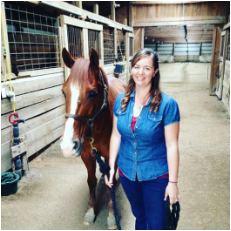 We are excited to announce that we are partnering with Integrated Therapy Services and will begin working along side Sarah Weiler and her team at ITS this summer to offer equine assisted therapy to clients and many other events to connect the community with horses! Check out their website here: http://www.integratedtherapyservices.org/ We are working together to provide many exciting events and services for the Olney and surrounding area communities. Sarah is passionate about expanding the world of therapy beyond traditional talk therapy, by providing various modalities to best serve her clients and the community. Services include music therapy, yoga, meditation, speech and language therapy, Advanced DIR Floortime, and much more! Be sure to check out our Events page to see what all is going on this summer at the barn and ITS! One of our first community activities is going to be a movie night where we bring along a horse friend for the community to meet!
0 Comments
Through our experiential learning workshops, I get asked this question frequently: "Well, how can horses help me learn about myself?" At the core of this work is allowing the horse to show up as their true, purest selves and share with us humans their teaching and healing powers. You see, the horse has a deep ingrained history with humans; once roaming free, then joining with us to reach distance lands, fight wars, provide transportation, competition and pleasure. What a gift horses have been in our lives to help one another evolve! This history is woven into our ancestry and contributes to our growth as evolving beings.
Working with horses provides a space for self reflection. There is a common phrase in the horse world that "horses are our mirrors." Meaning that they reflect to us what we are truly feeling and experiencing on the inside, not the illusion we are trying to put off on the outside. Horses see us at the core of our being, and when we try to mask this they react in ways to let us know that we are not matching on the inside and out. When our feelings/experiences match inside and out it is called being "congruent," when our feelings/experiences on the inside are masked on the outside it is called being "in-congruent." Here's an example: a person comes to visit their horse at the barn. They just got done with a heated argument on the phone with someone. As they walk out to the pasture to halter their horse they act happy, and the horse trots away. Still truly upset from the phone call, the person is now getting frustrated and upset that their horse is being difficult to catch. All they want to do is relax and hang out with their horse that brings them peace. The horse is sharing with them an important message though...they are saying 'I don't want to be around all the negative energy you're putting off right now, try catching me again once you've calmed down or admitted that you are still upset.' Once they take a moment to reflect on and observe why their horse might be trotting away from them, they begin to take deep breaths and 'shake-off' the argument from earlier. The horse begins to now approach the person, as they become more congruent and calm. Another way the horses can help us learn about ourselves is that they are always in the present moment (primarily as a means for survival). So often we are thinking about the future, or playing a tape player in our minds of past events. To be in the present moment allows us the space for self reflection, creativity, ingenuity, and intuition. Some of my greatest "ah-ha" moments and moments of self discovery have come to fruition in the presence of horses. Horses speak to one another with body language. 90% of human language is non-verbal, whereas 10% is verbal. When working with horses, we must exercise our nonverbal body language skills to be effective in communicating with horses. By exercising our nonverbal skills we become aware of our personal space, the space we need to feel connected to others, as well as how to read, be observant, and respectful of others body language cues. The beautiful aspect of this work is that the horses are able to be themselves, totally authentic in who they are. There are many other ways the horses teach us about ourselves, yet experiencing it for yourself is the best way to know! Visit our "Workshops" tab above to see a list of current experiential learning workshops; I also offer individual sessions. I have come to find that learning through experience is a great way to learn about many aspects of life, and what better way than with a horse by your side! Apollo is one of our loved lesson horses. He is a Norwegian Fjord Cross that came here in December 2014. Were we really looking for another lesson horse? Not really, but the Universe has a way of putting things in my life. I never would have imagined the journey we have already gone through together, but one thing was for sure that he was meant to be here with us. Apollo was named after the Greek god of prophecy, medicine, music, art, law, beauty, wisdom, sun and light. There is no coincidence then that what we soon embarked on together was one of healing, finding beauty in grim times, and great wisdom... It was early April. The vet had just come out to do routine vaccines and coggins. Everything looked healthy and good. The next week, buffalo gnats came out in full force. Apollo had developed a large edema (swelling) on his abdomen. I had assumed because of the buffalo gnats biting, that he had an allergic reaction. Cold hosing and liniment was working, but very slowly, so I decided to pick up some Bute (non-steroidal anti-inflammatory). This was taking the swelling down much quicker, but along with it he started to get diarrhea. So I took him off the Bute, despite there being some swelling left. His diarrhea was not improving after a few days, and he was becoming dehydrated and noticeably depressed. We started giving him electrolytes, with little success. I remember the first night I realized something was more seriously wrong than just a bad case of diarrhea. He was laying down a lot more than usual, his weight was noticeably decreasing more than just what he had lost in water from the dehydration. I brought the horses in that night, and he wasn’t interested in food. He kept lying down, getting up, walking lethargically. It was 11pm on a Thursday and I was to be up at 6am the following morning. I left his stall door open, asking him what he needed to feel better. He would walk out of his stall and walk a lap in the arena, poop (nothing but liquid), lay down in his stall, get back up, walk to the gate to go in the paddock, lay down, poop…This continued for about 30min. I began then to realize how important it is to give him the choice of where he felt the most comfortable, and to have the space to be able to do what he felt would help. Every time he would get up to walk, or lay down, he would pass poop. So outside in the paddock is where he chose to stay that night. I didn’t want to leave him outside in the open alone, so I put his best friend at the time out with him, Fancy. I set an alarm to go off every two hours and went out and checked on him. For the most part he stayed lying in the same spot, attempting to nap and regain energy. Early in the morning, Fancy had finally joined him and laid down for a nap too. She was a good support system for him, just by simply being there with him. All of the horses could tell that he wasn’t feeling well, and they responded in amazing ways…more on that later… The next day (Friday) the first thing I did was contact our amazing vet. She suggested that we draw blood and see why he was losing protein so fast. That afternoon, they were out and drew blood. Upon examination, they said he looked depressed and possibly had the signs of kidney failure or toxicity. I was devastated, but hopeful that the blood work would give us more of an idea of what we were dealing with so suddenly. The farrier was out that same day and was shocked to have seen his condition decrease so rapidly in 6 weeks time. Apollo barely had the energy to lift his legs for him to trim. The first Saturday in May brought us the blood work tests: high white blood cell count and everything else was out of normal range. Our vet came out for further examination and diagnosis. She taped his stomach fluid, and pulled out dense fibrous liquid. This fluid should be yellow and clear, able to read a book through it. With an ultrasound they were able to see the fluid all over his abdominal area. She thought that one area showed a possible growth, like a tumor, but it was hard to tell, it could have just been the back side of an organ. He never had a fever, was obviously lethargic and depressed, and had some labored breathing. We literally thought he was using all of his protein to just stay alive at this point…but what was causing all of these symptoms? The vet had suspected cancer, tumor, or internal rupture of some sort. And even if we pulled through this, the fibrous tissue in the abdominal area could adhere to the organs and cause them to stop functioning. She suspected that from his blood work findings that he had been dealing with this since before I got him in December. We were facing a grim decision, one that no one wants to make. My husband, vet and I all talked about what the best possibilities would be with and without treatment. In our minds and hearts we were planning on making the decision to euthanize, so that he wouldn’t be in pain anymore. To this day we don’t know what caused his condition. The only diagnosis he had for sure is called peritonitis (read more about it here: http://equimed.com/diseases-and-conditions/reference/peritonitis). For the time being we decided to get IV liquids put in him, and the vet had added some antibiotics to it, and left us with a bottle of antibiotics to give him intramuscularly. Through our wonderful community online and in Olney, I began to ask for help: prayers, positive energy, love, and light, anything to help Apollo out. I am amazed to this day how many people who have never met Apollo before came out to see him, and potentially say “goodbye.” My lessons students came out to give him treats and love. We didn’t have a date set to euthanize, we just knew it should be sooner rather than later. On Sunday (the day after the vet came out to diagnose), I had come into contact with an animal communicator locally. I couldn’t make the decision to euthanize Apollo without him letting me know he was ready. She read from Apollo that he knew he was sick, but was not ready to transition. At first this did not make our decision to euthanize him any easier, but after I talked with my husband about what Apollo had told the communicator, I figured if he was willing to fight for his life, then I would be there to support him and help him through.
Apollo went through 8 bags in total of liquids over the course of two treatments, which noticeably began to perk him up. From Saturday to Monday, we honestly began to see his top line fill in again. My husband and I could not believe it. We were skeptical though, thinking the visual weight gain was probably only from getting proper amounts of liquids back in him. Apollo was supposed to stay stalled while the IV catheter was in, but he was clearly telling me he wanted to be out with the others, so I let him. In total he went through four different types of antibiotics over the course of about 40 days. He began to graze on grass (limited, because he was also laminitic before I got him), and I started him on grain with immune support herbal supplements as well as electrolytes. Day by day we saw him come back to life, literally. His depression lifted, energy came back, his personality started to show through again, and little by little we noticed his top line fill back in. We pulled blood twice more, once after a week of antibiotics and his WBC count came down a little with everything else adjusting some too, and once at the end of antibiotics where everything came back to normal range! There’s no doubt that the traditional medication worked, and at the same time there’s no doubt in my heart that the amazing out pouring of love and support from the communities helped just as much. The other amazing element of healing came from the horses themselves. I watched as the lowest horse in the hierarchy and elder of the herd stepped up to protect Apollo from the more assertive mares. I watched the horses stand around Apollo, holding space and healing him with their own special powers. I learned from Apollo to trust in him to know what he needed, and to listen to my intuition. There is so much wisdom horses share with us, if only we will stop to listen, and I am so glad that I stopped to truly listen and hold the sacred space of possibility for Apollo. Not only has Apollo recovered from the inside, but on the outside I have noticed physical changes. When he first came here his tail was brittle and dry, and after going through all of this his tail is shiny and smooth! His mane use to sag over in the middle, which we thought was due to having a crested neck whenever he (likely) foundered before I had him. However, now it sticks straight up, and the muscle is nice and strong! He still has the same sweet, adorable personality that anyone can love. I am so lucky to have a healthier horse in all on the other side of this devastating sickness. THANK YOU, THANK YOU, THANK YOU TO EVERYONE that helped and gave love and prayers to Apollo. I know for a fact that he soaked it all in and used it as strength to fight and win this battle! I am amazed, and just over the moon thrilled that my happy, now healthy, sweet boy is with us still, and I could not have made it through this without my herd, both two legged and four. Thank you to my husband, family and friends who supported me and Apollo in navigating this journey! We are both forever grateful! Fear is a common emotion felt for first time riders, as well as seasoned riders. The most common fears are of falling off the horse, being hurt by the horse, or hurting the horse themselves.
Recently I had a young student ask me "how can I keep riding if I can't get over my fear?" She was afraid of letting go of the saddle at the trot, in order to slow her horse down with the reins. I asked her what she was afraid of happening, and she said "falling off." I asked her where this fear may have come from, has she ever fallen off before? No, she hadn't. So I coached her in the power of our thoughts, and how we look at things. I said "think about the fun you had, and how you were giggling and smiling when we first started trotting. If you think about and remember the good and positive experiences you have, it helps you look past your fear." I often like to make analogies to experiences outside of riding that students can relate to; so, I had her think about when she first started to ride her bike on her own. "Remember when you had training wheels, and when you learned to ride without them and mom or dad held onto your bike seat? What did it feel like when you rode your bike for the first time on your own?" "It was fun!" she exclaimed. "And now you can ride your bike all on your own, like you've done it all your life!" "Yeah, you're right!" she said. I asked her to look at horseback riding in this same way, and her demeanor began to shift. She started smiling more and her posture changed, to show more confidence. Half of being able to ride a horse is what is going on in your mind. I told her that I believe she can trot without holding on to the saddle, so she needs to believe she can do it too. If we tell ourselves we can't do it, then we won't grow. However, if we change our internal dialogue and what we tell ourselves, that we can do it, then we can begin to overcome our fears. Our thoughts become our reality. |

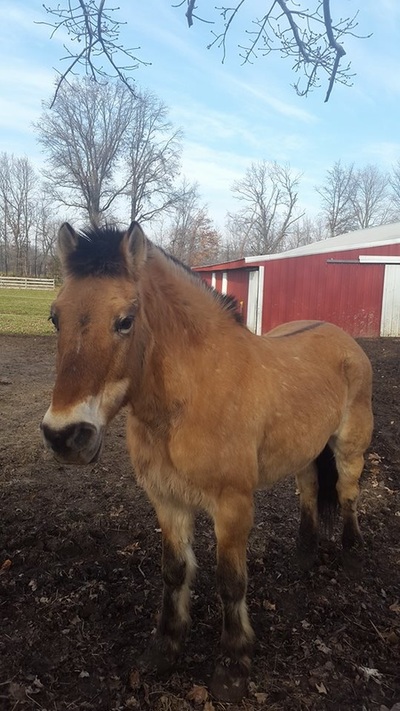
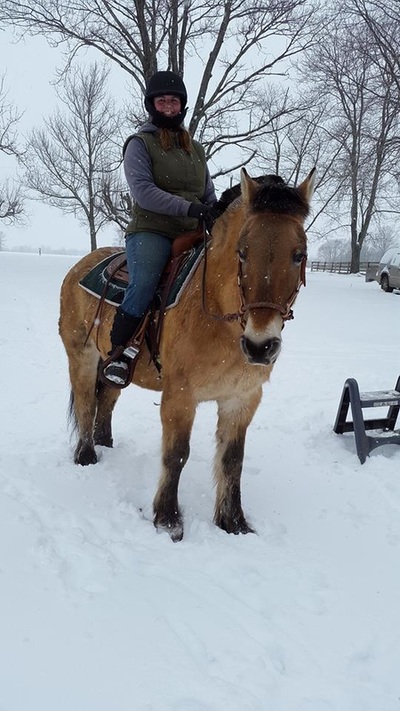
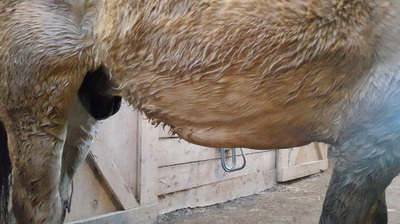
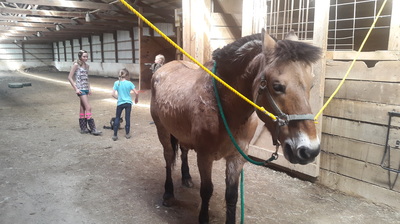
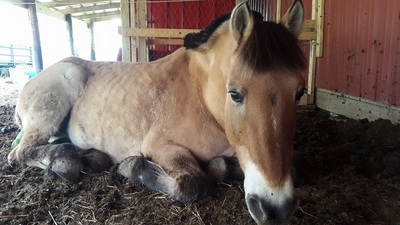
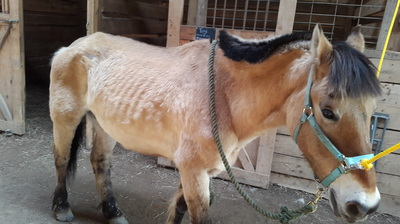
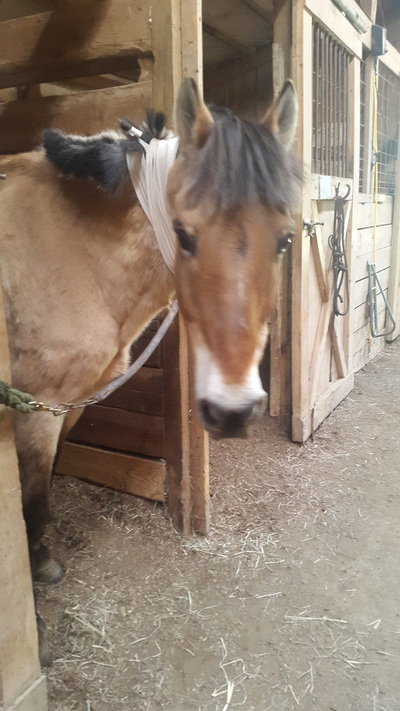
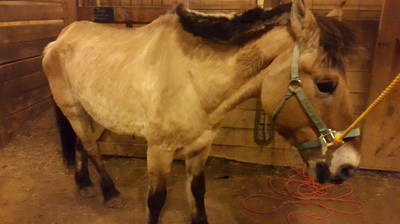
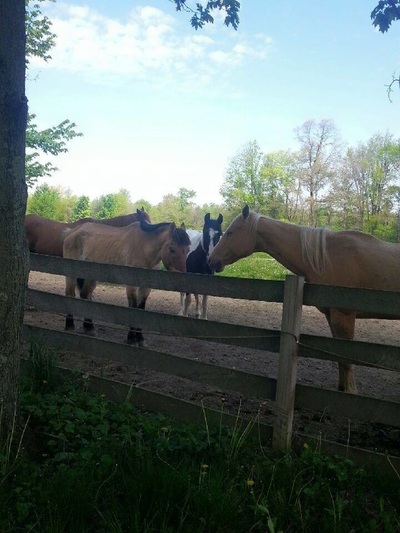
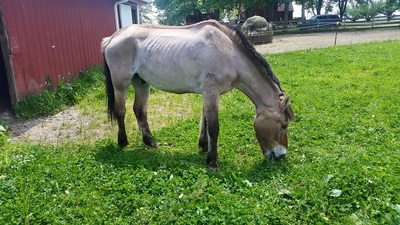
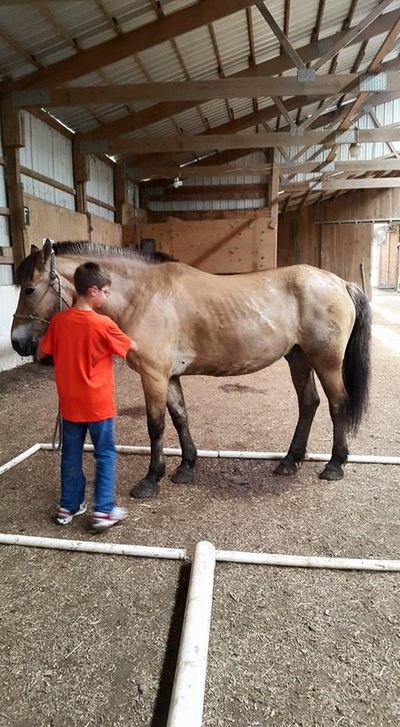
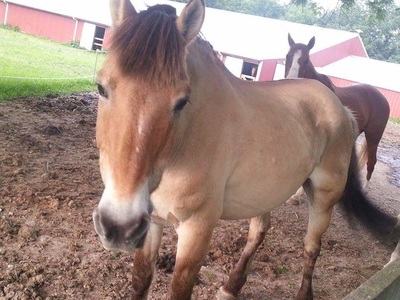
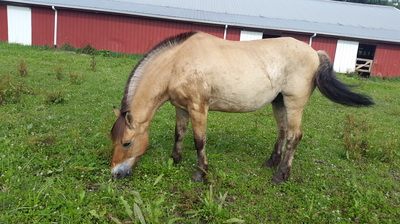
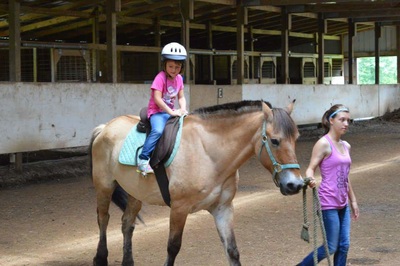
 RSS Feed
RSS Feed